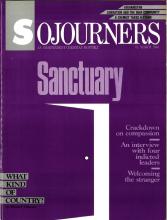Our plane was an hour late landing in Tucson. Jim Wallis, Yvonne Dilling, and I had left Washington, D.C.'s subzero weather seven hours earlier, and by our East Coast clocks, it was already 1 a.m. when we emerged into Arizona's balmy night. On the eve of arraignments in Tucson and Phoenix, we stepped into a focal point of the drama surrounding church workers who are offering sanctuary to Central American refugees.
The trial of Jack Elder, director of Casa Romero, a hospitality house for refugees in San Benito, Texas, was already under way in Corpus Christi. Having driven three undocumented Salvadorans to a bus station, Elder was charged with three counts of transporting "illegal aliens."
We asked the woman who had come to pick us up at the airport how things were going. She recounted a testimony given at Elder's trial.
Donovan Cook, a Baptist pastor from Seattle, Washington, came forward as a witness on behalf of Elder. According to people present in the courtroom, Cook gave a compelling testimony, with frequent references to Scripture. In response, the judge, also a Baptist, said something like this: "You are talking about feeding and sheltering and clothing needy people. Of course the Bible talks about those things. But the Bible says nothing about transporting them."
Cook looked squarely at the judge and responded, "My dear sir, let me point you to a very familiar story. The Good Samaritan found a wounded man in the road. He bound up his wounds, put him on his beast, and transported him to the nearest place of shelter."
Read the Full Article

